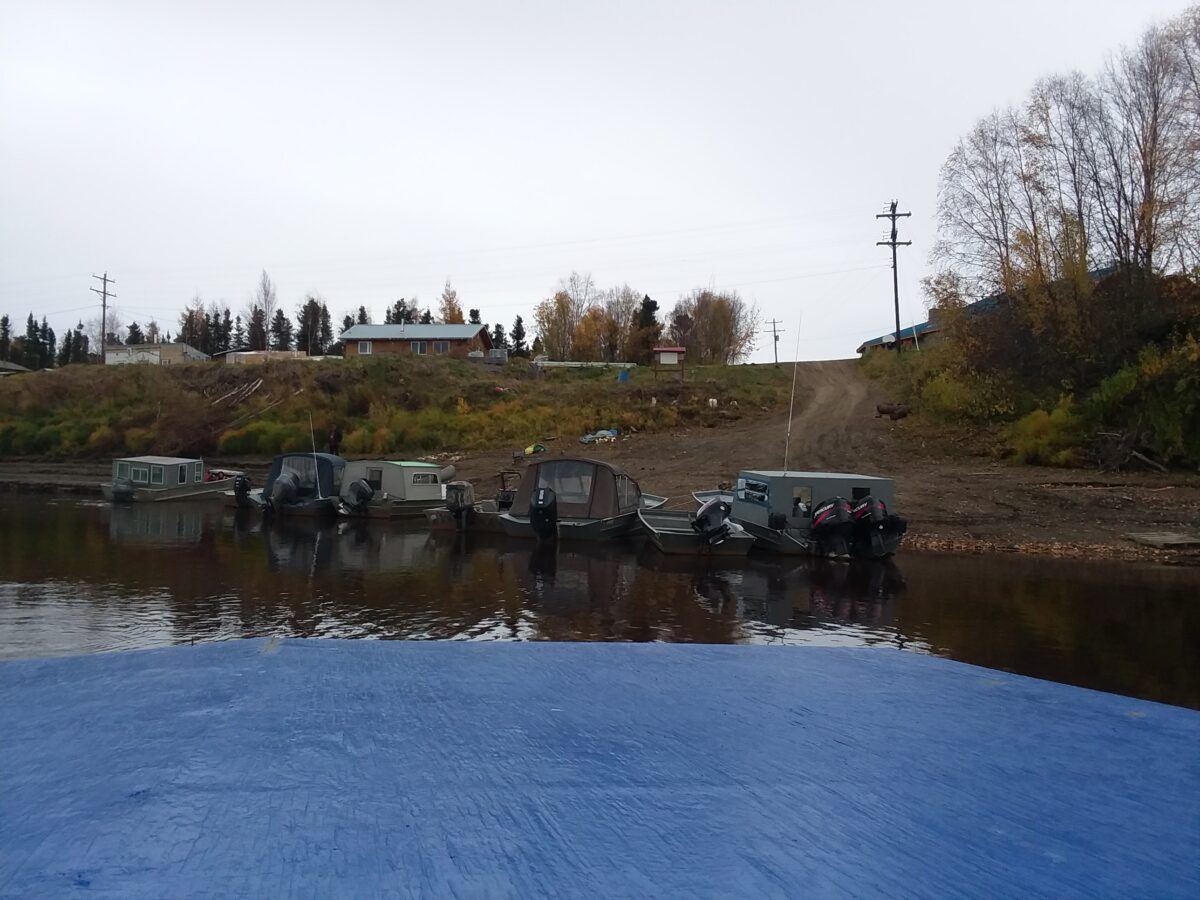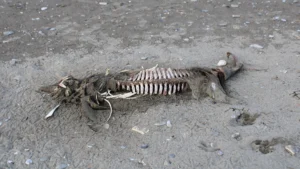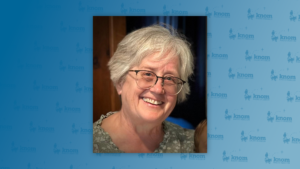New funding from the U.S. Department of Justice is allowing some rural communities to hire, train, and provide law enforcement where they previously had nothing. Holy Cross is one of those communities, but despite funding, they’re still struggling to find consistent law enforcement.
In July, Holy Cross received $185,000 to hire and train a tribal police officer (TPO). The community hasn’t had any formal law enforcement since late 2017.
Tribal Administrator Tess Paul says that’s been a challenge in almost every way.
“Not having an officer, oh gosh! Just not being able to respond to public safety including medical, first responder, search and rescue, fire… we don’t have a state trooper here. The nearest one would be the Aniak hub.”
The distance between Aniak and Holy Cross is approximately 55 miles; about two hours by snowmachine in the winter.
Holy Cross is one of fifteen communities in Alaska funded this year to hire law enforcement through the U.S. Department of Justice Community Oriented Policing Services (COPS). All of those communities applied for the grant; and COPS Director Phil Keith explains that DOJ experts review their applications and recommend only the ones in greatest need. Then staff review the recommendations and make sure the need is justified.
After Attorney General William Barr declared a state of emergency for public safety in Alaska in June, extra DOJ funds were directed to the state.
Holy Cross doesn’t have a strong cash economy, so administrator Tess Paul explains that they often rely on help from federal funding. Through this same COPS grant Holy Cross had a TPO from 2014-2017, but Paul says they were turned down for the funding in 2018. The COPS office has not yet said why a community with no law enforcement, like Holy Cross, would be denied funding.
TPOs hired with COPS funding must be trained at an academy, unlike some communities where the Anchorage Daily News and KYUK have previously reported that village police officers often work there with no training at all.
In Holy Cross, Tess Paul says the tribe has training figured out.
“We have them listed for the BIA police academy in New Mexico and there will also be additional training provided by the BIA police in the Northwest District in the U.S. and the training will be selected on the issues the tribe wants the officer to address.”
According to Tess, right now they need what she calls the “basics” for a public safety officer. Someone who can handle anything from investigating assault to DUI’s, and vandalism. She admits they’ve struggled filling the post before; many people, she thinks, are intimidated by working as the main law enforcement in such a remote area.
Last time the position sat open for months before a local stepped up to the plate. Like in other rural communities, Eugene Paul says that housing is definitely an issue. There’s a lodge where they could temporarily house a single officer but not a whole family. Holy Cross’ TPO would work directly with the state troopers, monitor the jail, and have the authority to summon an individual directly to tribal court.
Without a trained TPO, Holy Cross has to rely on its other leaders to step in as first-responders.
Eugene Paul is the Tribal Chief of Holy Cross, the presiding judge of the village Tribal Court, and for now, also the main police officer for the community. He imagines their community with a TPO, gives a little laugh and says, “Well, it really helps me out for responding to calls in the community. Most of the time our calls come in after ten o’clock in the evening.”
Policing isn’t something he gets paid to do but as the chief he says, taking care of tribal members is what he does.
Eugene has judicial training, but no formal training related to public safety. He doesn’t carry a weapon, and Eugene brings in extra support from the other tribal council members when he needs to.
“The people in the community really respect the tribal chief so usually, if I show up, it kind of calms down a little bit. But it’s really diffusing the situation.”
He’s been chief for 13 years and Eugene relies a lot on knowing how to talk to the fewer than 200 people in the community. But even then, he says there are situations beyond his ability.
“I did have some Troopers come in when I had a person who was kind of suicidal and had kind of locked himself in so it’s not really me busting the door in and trying to get him. So I did have to call the Troopers. They have training. They have the tools to do that.”
In that case Eugene said the Troopers were able to dispatch quickly out of Bethel and be there within a few hours. But, for less pressing concerns, he says they’ve waited days for Trooper response.
Tess Paul says Holy Cross has been pretty lucky with the Troopers. She can’t recall a recent situation where they didn’t come help in a violent situation, though she alluded that in neighboring communities that isn’t always the case. For both Tess and Eugene there’s an anxiety that someday a trained response won’t come quick enough.
Eugene isn’t trained to collect evidence or investigate, either. When someone becomes a danger to themselves or others in Holy Cross, there isn’t a secure jail to hold them in, so he somehow has to detain the person in their home or in his office until troopers can come help.
He worries about what would happen if something like a sexual assault were to happen with no law enforcement to respond.
“That would be devastating for our community right now.”
He hopes they can hire a TPO with this year’s COPS grant, before a public safety emergency in Holy Cross happens. The grant only funds an officer for three years.
Tribal Administrator Tess Paul notes that the clock is ticking.
“The grant is already available as of July first, we didn’t get word until maybe middle of August that we were awarded the funding.”
That applicant would have to complete a background check for any assaults or felonies, as per their conditions for funding, Tess explains. And then they still have to be trained.
Though she has the application on various job boards, and radio stations, by the first week of November, Tess Paul still had no applicants.
In the past, a local has always stepped up to the challenge and Eugene is reaching out to people he thinks would be a good fit. For now, policing remains up to Eugene Paul and the tribal court. To hear more about how Holy Cross and other communities are turning towards tribal justice to uphold the law in their community, check out the second part of this Holy Cross two-part story.
Image at top: Coast of Holy Cross. Photo from Iditarod Area School District.http://www.iditarodsd.org/cross-country-2019-20
*Correction: Initial version of this story referred to Tess Paul as the City Administrator, but Tess Paul is the Tribal Administrator of Holy Cross.





